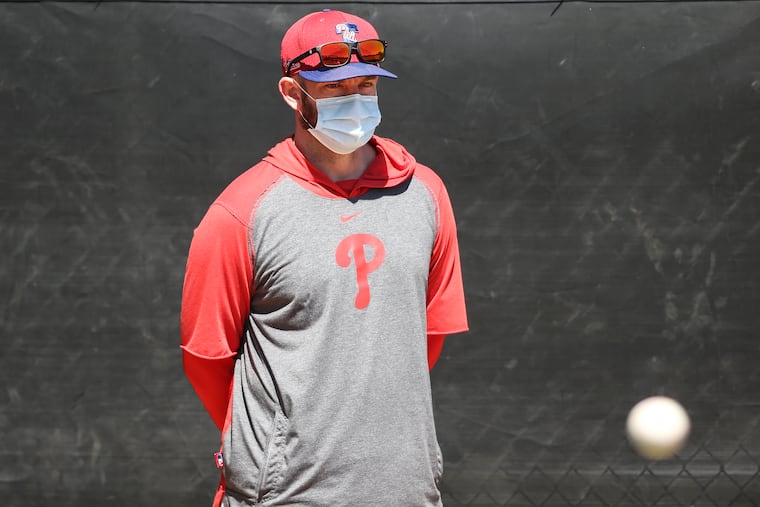‘Lifelong learner’ Caleb Cotham brings data-driven approach to role as Phillies pitching coach
Early reviews of the Phillies' first-year pitching coach have been positive, even among pitchers who don't typically incorporate analytics and technology in their routines and preparation.

Caleb Cotham was 28 years old when he appeared in his last major-league game in 2016. Later that year, many teams began using Rapsodo to analyze spin rates, velocity, horizontal and vertical movement, release points, and other pitching data points.
Surely, then, Cotham must have wondered how his career would’ve been different if he had access to that technology.
Maybe he would even still be pitching.
“My knee says otherwise,” Cotham said, laughing. “But it is interesting to look back and think. How would I have coached myself, right?”
The Phillies hired Cotham in November to be their fifth pitching coach in as many years. It’s his first time in the lead role after only two years as the Reds’ assistant pitching coach. He’s just 33 -- and all of 24 days older than Phillies pitcher Chase Anderson. He’s younger than relievers Brandon Kintzler and Tony Watson.
But Cotham was regarded as a rising star in the coaching ranks because he speaks the high-tech language of modern pitching. It was a curiosity for him in college and coming up through the minor leagues. And after his playing career ended, he learned more about it by working with Driveline Baseball, the Seattle-area think tank that specializes in data-driven training.
“He’s a lifelong learner,” Reds pitching coach Derek Johnson, Cotham’s coach at Vanderbilt and mentor in Cincinnati, said by phone. “I’ve known him over half his life, and he’s always been interested in the intricacies of the game and the finer points. If there’s something that’s cutting edge, he’s interested in it. That’s just the way his mind works.”
» READ MORE: Yankees 4, Phillies 0: Tony Watson enters bullpen competition with scoreless inning
Cotham also understands that not everyone shares his curiosity. So when Phillies ace Aaron Nola, for instance, says early on in spring training that he’s “not really big on the technology,” Cotham knows better than to clutter his mind with information while still gathering and applying it in ways that may help Nola improve.
“The trick is meeting the player at whatever point he’s at,” Johnson said. “A great trait of [Cotham’s] is he’s able to learn how much [information] he can give them, almost how much bandwidth they have for it.”
Thus far, the reviews of Cotham have been positive. As pitchers have progressed from throwing bullpen sessions and live batting practice to appearing in exhibition games, they have gotten more familiar with his coaching style and philosophy. In turn, he has begun to figure out how much input they like to receive.
Anderson, in particular, was eager to work with Cotham. In 2017, the right-hander had the best season of his career for the Milwaukee Brewers with Johnson as his pitching coach. The chance to learn from Johnson’s protégé was one reason that Anderson decided to sign a one-year, $4 million deal with the Phillies.
“Caleb’s in his first year as a major-league pitching coach and you wouldn’t tell it,” Anderson said. “He’s hit the ground running. I’ve been really impressed with how he’s gone about it.”
To wit: Anderson said he was throwing a bullpen session before his first spring-training start and got a piece of advice about his curveball that “really clicked in my head.”
“I threw the next one, and it was how I wanted it to be,” Anderson said. “He has a lot of the same lingo when we chat that [Johnson] had. DJ was a big influence for me, and now Caleb is the same thing.”
Zack Wheeler said he has asked Cotham about the Edgertronic camera, which captures pitch movement at more than 1,000 frames per second. Anderson is interested in using the TrackMan device to see the difference between certain pitches.
But he doesn’t want to go overboard either.
“Sometimes you throw a curveball and you think that your hand’s in a certain spot, and you look at the camera in slow motion and it’s not what you think or what you feel,” Anderson said. “So, I do like those things. But I wouldn’t say I’ve 100 percent dove into that kind of stuff because I think you get too deep you can kind of mess yourself up. It’s definitely a tool to hopefully get better and pitch for a long time.”
Cotham’s career ended shortly after he underwent knee surgery in August 2016. He went to spring training with the Seattle Mariners in 2017, but announced his retirement before the season with a 7.15 career ERA in 35 appearances, all in relief.
» READ MORE: Phillies' new-look bullpen all about high velocity and ‘creating an attitude’
There’s no telling what would’ve happened if he hadn’t gotten injured. But there’s also no doubt he would’ve tried to use new technologies to his advantage.
“You can fine-tooth comb almost anything now,” Cotham said. “I was a guy that, maybe I should’ve thrown my curveball more because it spun really fast. You kind of don’t know until you know.”
And for pitchers who don’t want to know?
» READ MORE: Why Phillies manager Joe Girardi is worried about pitchers hitting again this season | Scott Lauber
Phillies manager Joe Girardi believes Cotham can help them, too.
“[Nola] may not use it, and I’m OK with that, because sometimes it can be too much for a player and we don’t want to freeze them up,” Girardi said. “But that doesn’t mean we don’t use it, right? Whatever tools that we can use to help a player, we’ll use them.”